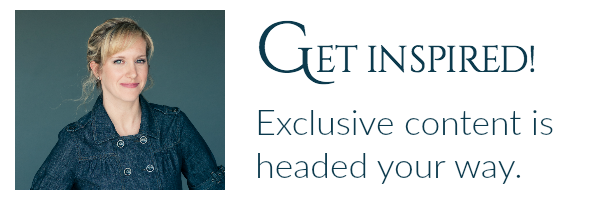by Kelli Stuart | Like a River From Its Course, Novel, publishing, Ukraine, World War II
When working on Like a River From Its Course, I knew that I wanted to give as historically accurate a glimpse into World War II Soviet Ukraine as I could while still offering myself plenty of creative license with the stories. Having so many real life stories to draw from helped shape many of the characters and their narratives, but what about the side stories?
What about the real life men and women responsible for the heinous acts of the 1940’s?
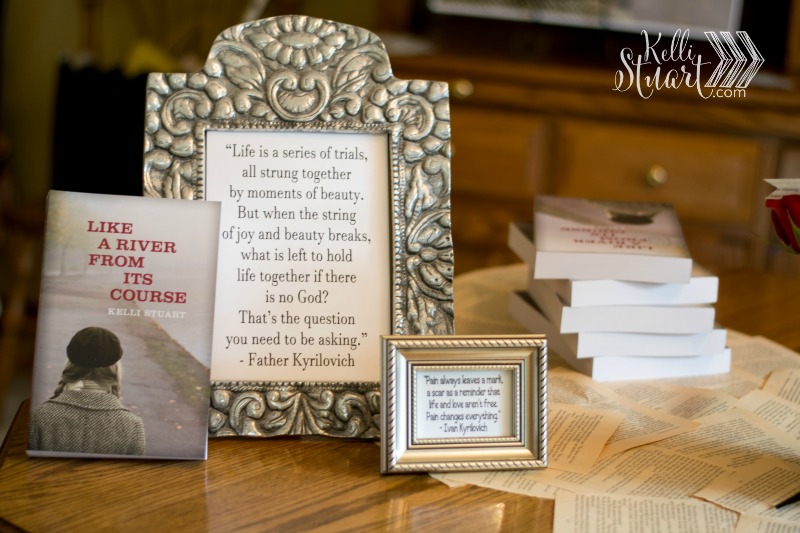
Writing a book about World War II is daunting. The market is fairly saturated with stories from that era, so how would I write about those days in a way that was fresh and new? I needed to add an element of realism to make those wretched years come alive.
I spent countless hours researching the events that took place in Kiev, Ukraine, with the largest tragedy occurring at Babi Yar, the “killing ditch” where roughly 34,000 men, women, and children were killed in just two days time.
The mastermind behind that horrific event was a man named Paul Blobel.
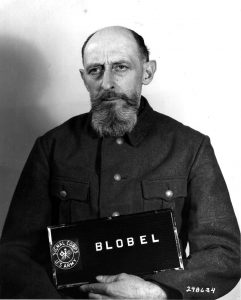 A wicked, wretched little man, Blobel not only took credit for ordering thousands of Jews killed, but he was known to speak highly of his involvement in these mass executions.
A wicked, wretched little man, Blobel not only took credit for ordering thousands of Jews killed, but he was known to speak highly of his involvement in these mass executions.
In one of the books I read, a story was told of the day that Blobel and one of the Gestapo leaders drove past Babi Yar. The decomposing bodies of the Jews lay smoldering in the narrow ravine, and as the story goes, Blobel looked at the smoke, rising into the air in plumes of heartache, and said to his comrade, “This is my ditch. Isn’t it grand?”
The level of hatred that this one man possessed, and the demons that operated from his shell of a body were hard for me to comprehend. There were days when I had to swallow hard the bile of anger as I considered his actions, and those of the many like him.
It is these aspects of the book that make the story gritty and tough to read. I couldn’t possibly gloss over the sheer darkness of those days and somehow honor the fallen. If we are to respect their memories at all, then we must respect the wretched ways in which they died.
[Tweet “Like a River From Its Course is a story of the past. But it’s a message for today.”]
Including some of the real life characters in the book gave me a chance to show the extreme depravity of these men. But it also shined a light on the beauty and resilience of those who fought and survived those years.
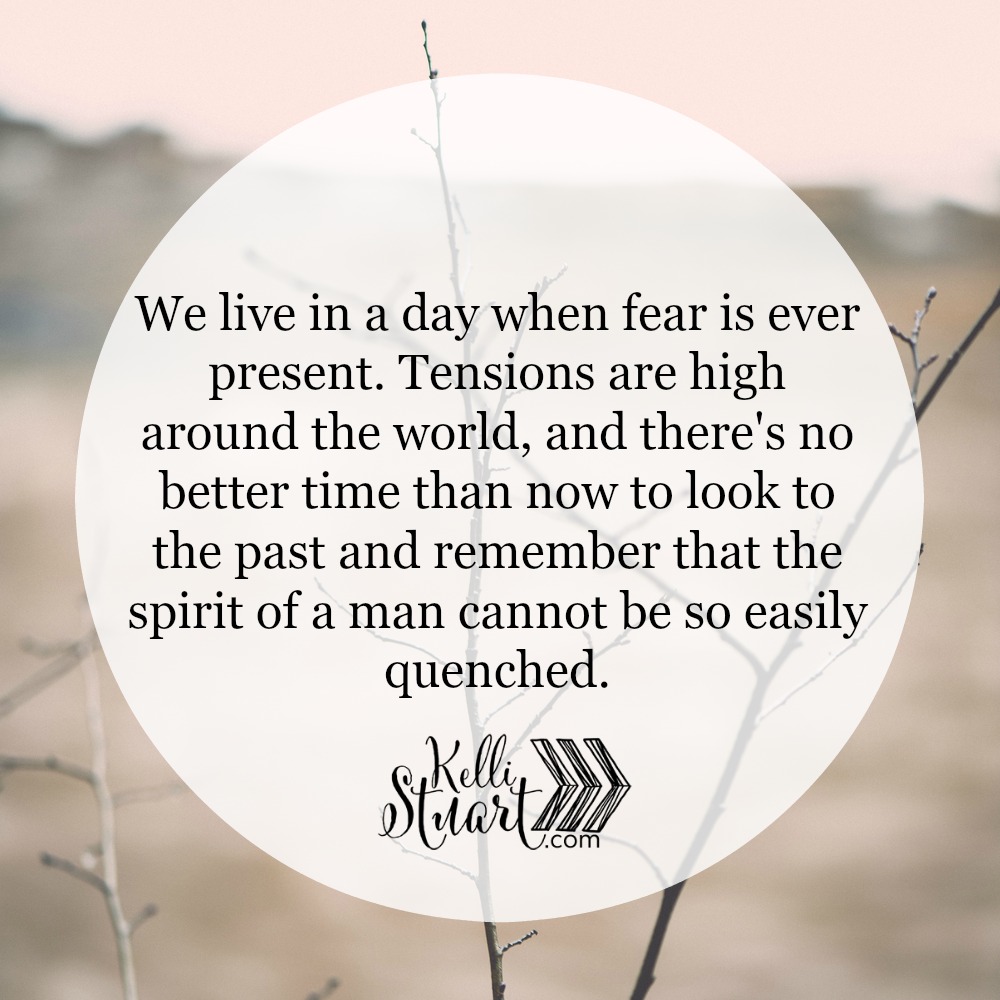
Juxtaposed against Paul Blobel’s ugliness was the beauty of Ivan Kyrilovich, a man who was willing to give his life for his Jewish neighbors. Maria Ivanovna was willing to take a beating for her friend. Luda Michaelvna chose love over hatred after being assaulted. Sergei Ivanov worked as a partisan, despite the danger it put him in.
For all the horror of World War II, there was a whole lot of hope, and when you start mining through all these stories you find that the wretchedness of men like Paul Blobel cannot withstand the ultimate beauty of the human spirit.
We live in a day when fear is ever present. Tensions are high around the world, and there’s no better time than now to look at the past and to remember that the spirit of a man cannot be so easily quenched.

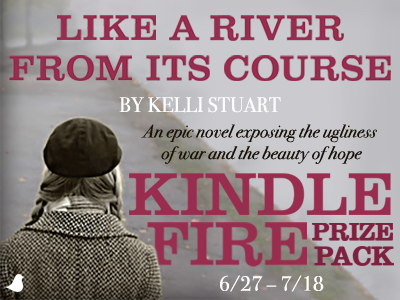
There’s still time to enter the Kindle Fire Giveaway if you haven’t done so yet. It’s quick and easy to enter, and the prize is great! You can win a copy of Like a River Form Its Course, a Kindle Fire with the case of your choice, and a $30 Amazon gift card.
*this post contains affiliate links*
by Kelli Stuart | Like a River From Its Course, Novel, publishing, Ukraine, veteran's stories, World War II
It’s funny how God puts people together.
Lee and I were freshly married and just beginning our life together in Frisco, Texas. We’d been in town for one week when we got together with a couple whose names I do not remember, nor do I recall how we were connected with them in the first place. I just remember going to lunch and telling these strangers that I needed a way to keep practicing my Russian language so I didn’t lose it.
“Oh, I know the perfect place!” the strange lady said. “There’s a gymnastics academy here in town run by Russians. You should go in an talk to them, and see if there’s a community here to get involved in.”
The next day, I visited the World Olympic Gymnastics Academy for the first time. Sometimes, I chuckle at my tenacity. I walked in and told the receptionist I was looking for someone who would speak Russian with me. She looked at me as if I had two horns growing out of my head, then led me into the gym and introduced me to Valeri Liukin and Evgeny Marchenko.
“I want to practice my Russian,” I said. Valeri cocked his head to the side slightly and smiled.
“Do you know anything about gymnastics?” he asked.
It just so happened I had been a competitive gymnast as a kid, and had coached on and off through high school and college. I nodded my head and he looked at Evgeny.
“Do you want a job?” he asked.
And so it was that I began working at WOGA not because I was looking to be a coach, but because I was looking for Russian speaking community. For two years, the coaches at WOGA took me under their wing, inviting me to parties, answering my incessant questions, helping me understand the nuances of the language I loved, and so much more.
They were my people, and it was them I was saddest to leave when we moved away.
The year after we moved, I contacted Evgeny with yet another odd request.
“I’m going to Ukraine to interview veterans for a book I want to write. Do you have any contacts there who can help me?”
It so happens, Evgeny’s mom lived in Vinnitsya, Ukraine, and within a week it was all set up for me to spend a few days with her.
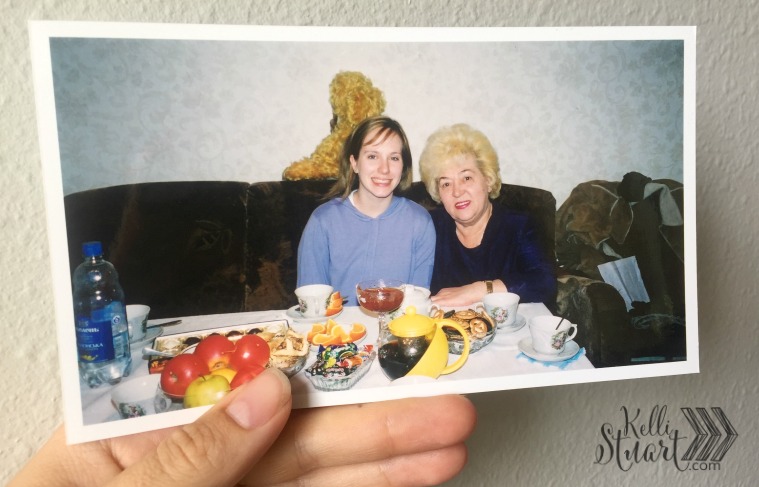
A pregnant, sick Kelli, with Victoria and her table full of food!
Victoria Marchenko welcomed my mom and I into her home with open arms, and a table brimming with food. I was sick when I arrived, having picked up a terrible cold on the trip, and she immediately took it upon herself to cure me with tea and vereniki (think dumplings filled with meat – yum!).
Victoria was a true gem. She mothered me for the next two days as she took me around town, introducing me to some of the most fascinating people I would meet in all my travels.
She took me to the home of her friend, Elizabeta Semenova, a woman who worked as a partisan and whose experience became central to the story of Luda.
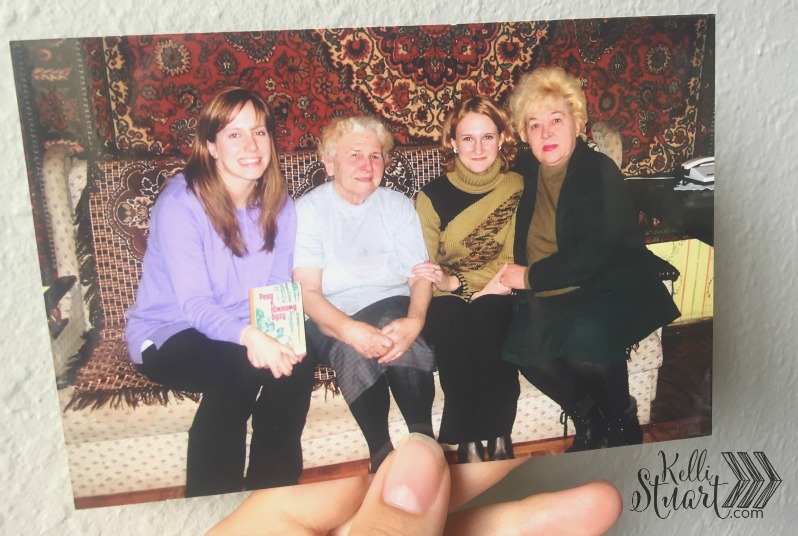
Me, Elizaveta, my dear friend Sveta, and Victoria in Elizabeta’s home.
She took me to a group of veterans who were one of the liveliest bunch of men I’ve ever met. They told their stories one at a time, and Victoria sat in the corner taking it all in. You could tell she was respected and admired within her community, and I felt a sense of pride just being in her presence. Somehow I knew I’d found a very special lady.
Victoria also told me about Vervolfy, Hitler’s underground bunker built just on the outskirts of Vinnitsya. Now just a meadow with no seeming significance (though the site has never been excavated, which gives it a mysterious quality), Victoria made sure I understood the gravity of what occurred at that place. Her description was so vivid and passionate that when I finally visited the site in person, I felt a hallowed awe for the men and women who died there.
This book wouldn’t have come together the way it did if it weren’t for Victoria Marchenko.
It wouldn’t have come together at all if I hadn’t been to audacious to walk into that gym so many years ago and just ask someone to talk to me. I mean, really – WHO DOES THAT?!
What a lovely thing it is to see the tapestry of this project woven together for such a time as this.

Speaking of the book, it’s time for another GIVEAWAY!

Litfuse Publicity Agency started their blog tour for Like a River From Its Course, and you have the opportunity to win big! They’re giving away a copy of the book, a Kindle Fire, a Kindle Fire case (winner’s choice), and a $30 Amazon gift card. And the best part is, it’s super easy to enter!
Don’t let this stop you from purchasing the book, though! Order your copy of Like a River From Its Course* today and find out why people are calling it the best book they’ve ever read.
If ever there was an opportunity for me to honor the memories of Victoria Marchenko, and all the men and women to whom she introduced me, this book is it.
Thanks for honoring them with me!
*affiliate link included
by Kelli Stuart | Like a River From Its Course, Novel, publishing, Ukraine, World War II, Writing
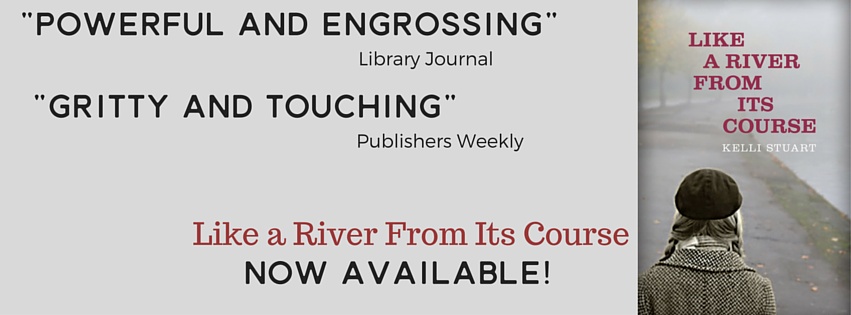
Well here we are.
After years of research. And a few more years of seeking representation. And then a few months of seeking publication. And then another year of editing and marketing and incessantly talking about the book.
HERE IT IS!
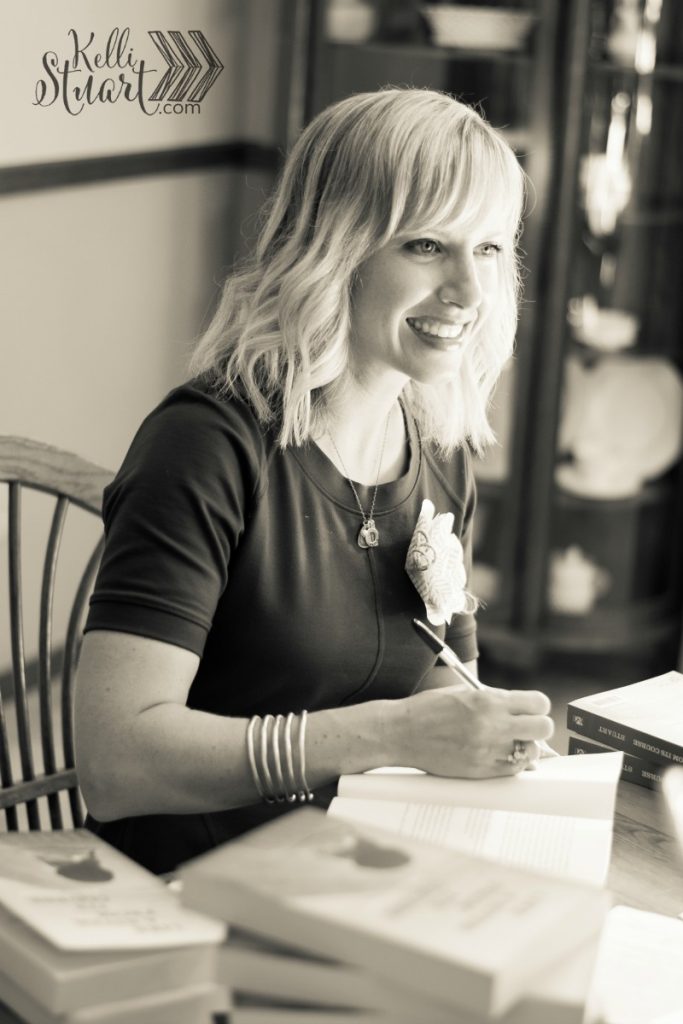
Like a River From Its Course officially launches today. This is the day I’ve been waiting for since I was 22 years old. This is the day I dreamed about.
These are the stories I wanted the world to hear.
I pray I’ve done them justice. I pray that the men and women who are represented by this book are honored, because my deepest heart’s desire is to prove that there are still stories we haven’t heard.
In a world that feels unpredictable and frightening, I wanted to offer a book that gave hope. Four years ago, I visited Tanzania with Compassion international, and in the deep red soil of Africa, the Lord imprinted upon my heart the words that would become my life’s anthem:
The evidence of that truth becomes more and more clear to me with each passing day. Hope is slow. But oh my friends, hope is alive. It is so alive, and it’s real, and when the world feels dark and scary and uncertain, we can cling to the fact that hope is here.
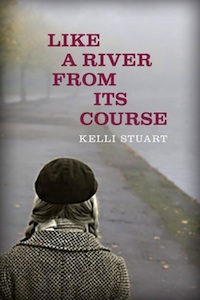 We need the stories in this book for such a time as this. We need to be reminded that man cannot be so easily broken. We need to recall a time when people rallied against a greater evil. We must remember the men and women who put their own lives on the line so that they could protect their neighbors.
We need the stories in this book for such a time as this. We need to be reminded that man cannot be so easily broken. We need to recall a time when people rallied against a greater evil. We must remember the men and women who put their own lives on the line so that they could protect their neighbors.
We need these stories. And we need them right now.
I don’t know if I’ve done a good job with this book launch. I don’t know if I’ve become annoying with all the promoting and marketing. I don’t know if I’ve spoken to the right people. Maybe I’ve been too forward. Maybe I’ve been too timid.
I’ve made mistakes along the way, and I’ve learned a whole lot in the process.
But today I know that none of that matters. Today is a celebration because today the book is officially out in the world.
Today I can finally say I delivered on my promise to share these stories.
Today I can say I’ve seen a dream fulfilled.
Today I give these stories as a gift to you. Please treasure them because they’re precious.
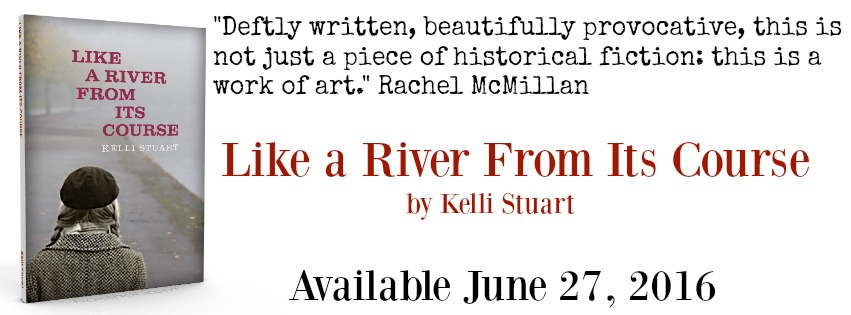
And today I say thank you to all the people who have cheered me on.
Thank you to the people who wouldn’t let me give up when I wanted to throw in the towel.
Thank you to the people who were waiting at the finish line with chocolates and cheers of excitement.

Thank you to the people who don’t know me, but who agreed to take a chance on a debut novel by an unknown writer. Thank you for taking that chance, and for sharing how the book impacted you.
Today is LAUNCH DAY!
I’m proud of this book. I am proud because it’s the stories of a beautiful people who I love as my own. I’m proud to bring their stories to the rest of the world.
Happy LAUNCH DAY!
Like a River From Its Course is now available for purchase on Amazon, Barnes and Noble, ChristianBook.com, and wherever books are sold.

Want to help me spread the word? (Say yes)
Visit the book page for images, links, and tweets that you can quickly and easily share with your followers!
Post the link to purchase the book on Amazon.
Post a photo of yourself holding the book, and tag me in it so I can say THANK YOU!
Join the Thunderclap – I need 59 more people to sign up for the campaign to take effect.
Tell your friends, neighbors, colleagues about the book!
Request the book from your local library!
If you’re connected to anyone in the media who could help me spread the word, I’m looking for contacts!
Anything you can do to help is deeply appreciated!
Thank you!
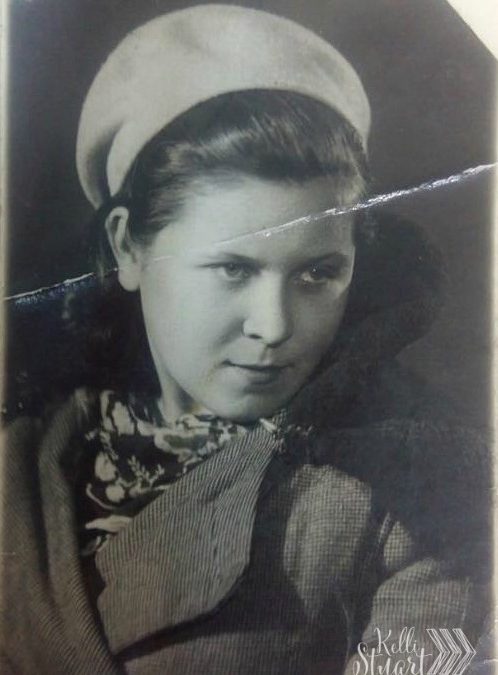
by Kelli Stuart | Like a River From Its Course, Novel, Ukraine, veteran's stories, World War II, Writing
I spent the better part of two days last week tearing my house apart.
I was on a search for a photo. I could see the picture in my mind, but it wasn’t any of the places I imagined I would have put it. The up side to all this searching was the natural consequence of cleaning out drawers that desperately needed to be cleaned.
I finally decided to check the attic, even though I knew for certain the photo couldn’t be up there. Hadn’t I seen it recently?
I opened the first album I found and gasped. There she was, just as I remembered her, staring up at me with those kind, smiling eyes.
Ladies and gentlemen, I would like to introduce you to the real Maria Ivanovna.
Maria’s story is fictionalized in my novel, though of all the storylines, hers stays truest to the real life plot. Some of it is fictionalized based on other stories that I gathered, but the skeleton of the entire book started with this woman right here:
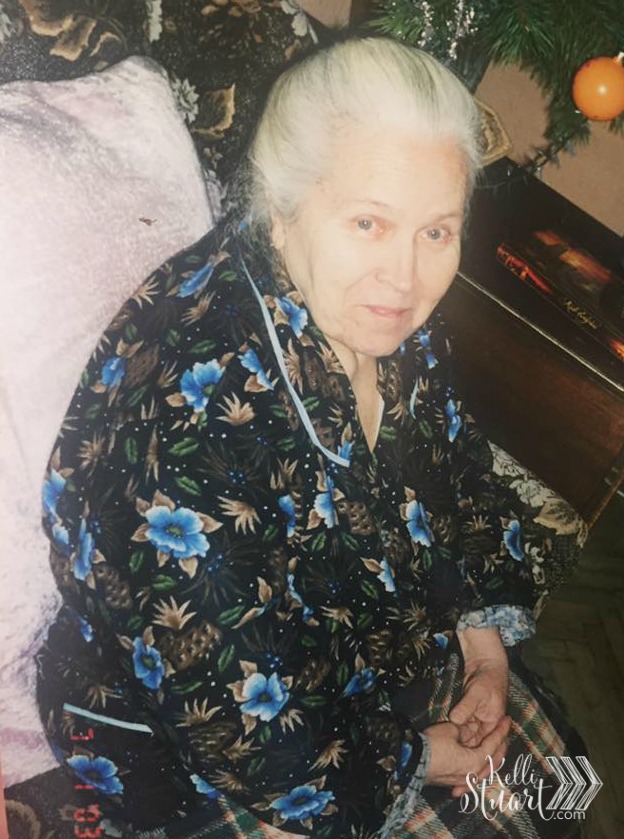
Isn’t she just lovely?
And as I mentioned in the post about Baba Mysa, that character was also a composite of this real and lovely woman who entrusted me with her story so long ago.
After I found this one photo, I was hungry for more, so I reached out to my dear fried in Ukraine, who also happens to be Maria’s granddaughter, and I asked for more photos.
Alyona took me into her home when I was 20 years old, and she gave me her bedroom for four months so that I could study Russian. Every day, I’d walk from her little apartment on Shamrila Street to the train station, and I’d make the hour long trek to the Institute of Foreign Languages for my classes.
It was one of the grand adventures of my life.
The photos Alyona sent me brought tears to my eyes, because they brought not only the character of Maria Ivanovna to life, but they also gave me more of a visual for the real Maria.
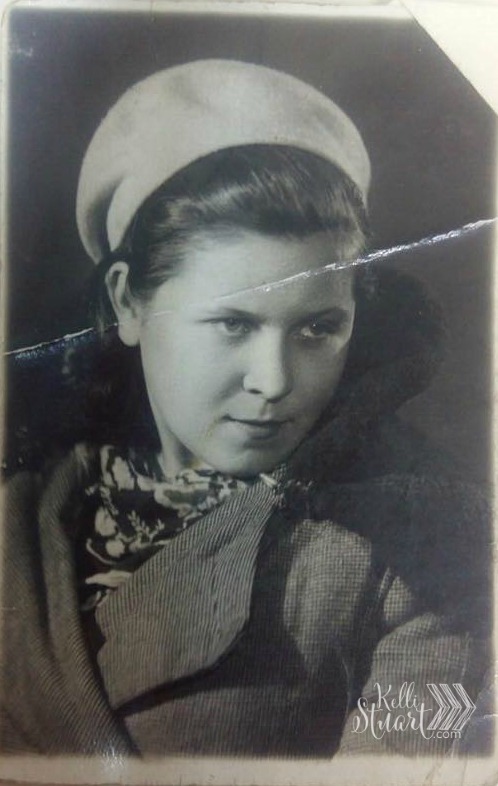
Maria as she was making her escape from Germany.
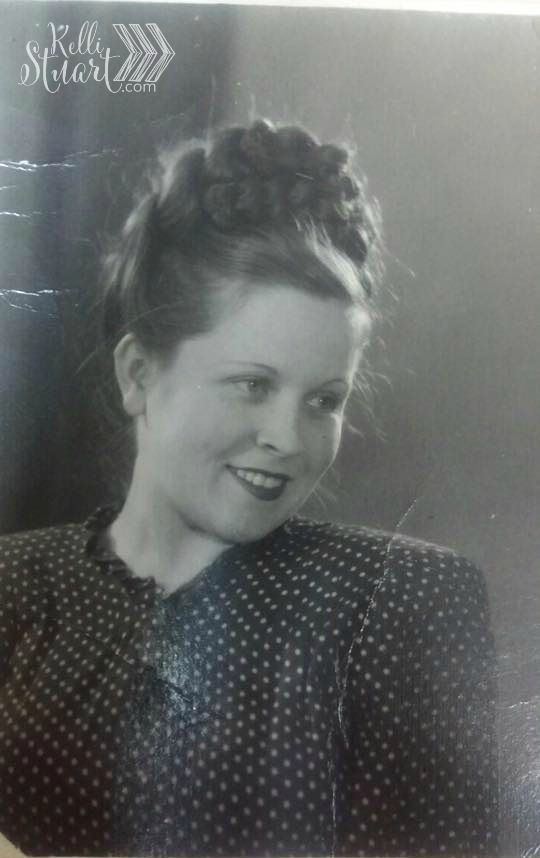
Maria after the war.
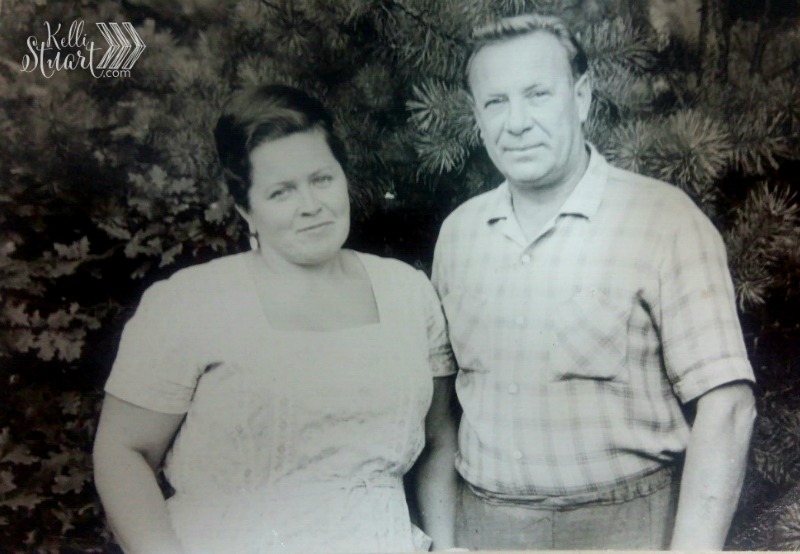
Maria and her husband.
It’s easy to forget sometimes that history is real people. It isn’t just stories. When we’re so far removed from an event that is now immortalized in film, television, and history books, we overlook the before and after of all this history.
Maria had a history before the Germans forced her into slave labor, and she had a future after she returned. She was more than the moment of her captivity. She was real, and she was a delight.
The final picture I found was taken on the night that I met Maria face to face. It was 1996, and we were in Kiev, Ukraine. I had been invited to have dinner at Maria’s place, and while there, she shared her full story with me.
That was the birth place of Like a River From Its Course.
Now, before I show you this picture, I would like to sincerely apologize for what I’m wearing. I don’t ever remember owning such a sweater. It appears I let Mr. Rogers dress me for that evening.
You’ve been warned.
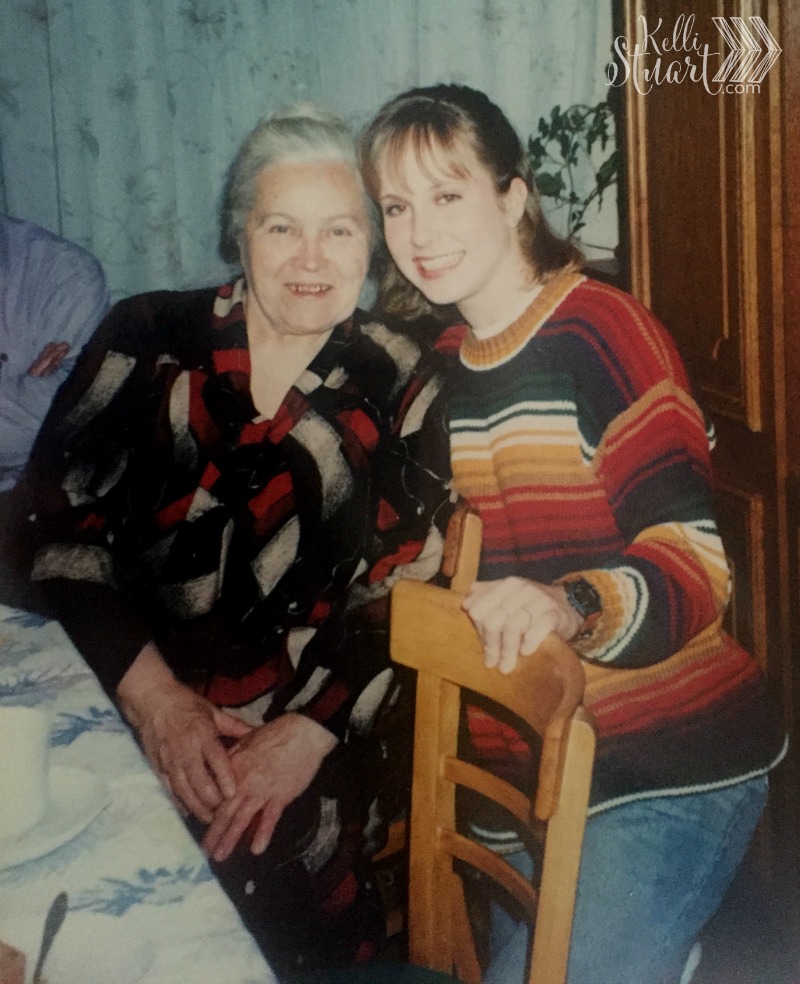
Kelli (in a most unfortunate sweater), and Maria. April, 1996.
History is real people, and as you read my book, I hope you will remember that these are more than just stories. These were lives. These were men and women who refused to be defined by one moment in time.
In the wake of all that’s occurred in our own country this week, it’s good to remember that we are more than one horrific event. We can still learn from history. We can honor the fallen, pick up the pieces, and refuse to be defined by that terrifying moment.
History is real people, and history is happening even today.

 Like a River From Its Course is now available wherever books are sold!*
Like a River From Its Course is now available wherever books are sold!*
Also, if you’ve read the book, would you be so kind as to leave a review on Amazon or Goodreads? Those are kind of a big deal. *wink*
Thanks, everyone!
*affiliate link included
by Kelli Stuart | Like a River From Its Course, Novel, Ukraine, World War II, Writing
Writing a historical fiction novel is daunting.
Setting a historical fiction novel in World War II Soviet Union might just be crazy.
When I set out to write my novel, I wanted to develop a story that was as historically accurate as possible while still offering myself creative license. This proved to be an overwhelming task given the vast history of those years, and the many different conflicting accounts of what happened.
There were times when I wanted to give up altogether.
Other times, I wondered if I should just make it Science Fiction. Hitler could be a Vampire, and all his cronies would be various forms of the undead.
It would’ve been a hot seller, but the premise sounded dumb, so I pressed on.
When it came to writing the Ukrainian characters, the stories flowed (almost) easily. I knew their stories, and so fictionalizing the tale didn’t feel like a chore. But writing the story of Frederick Herrmann, a young Nazi soldier hell-bent on carrying out the mission and task that his country and set before him left me almost paralyzed at times.
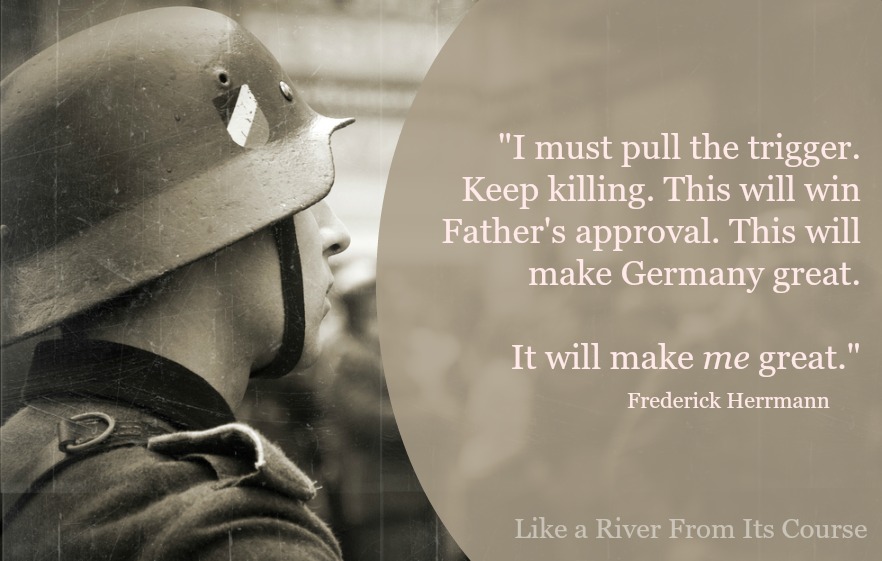
I am a bit of an idealist. The actions of the Nazi soldiers was something I couldn’t quite comprehend. How could so many young people follow so blindly the ideology of a clear tyrant and psychopath? How could they kill so robotically? And how did they live with themselves later?
I needed a reason, and so I set out to find one, but the research often led me to images that were so horrific, I had to step away. There were days when I hated Frederick and all that he stood for. I didn’t want to write of such atrocities, because I didn’t want to believe that people could really be that evil.
Frederick is the only purely fictional character in my book. While all of the other characters are based on the stories of men and women I met in Ukraine, Frederick came a little more reluctantly from my imagination.
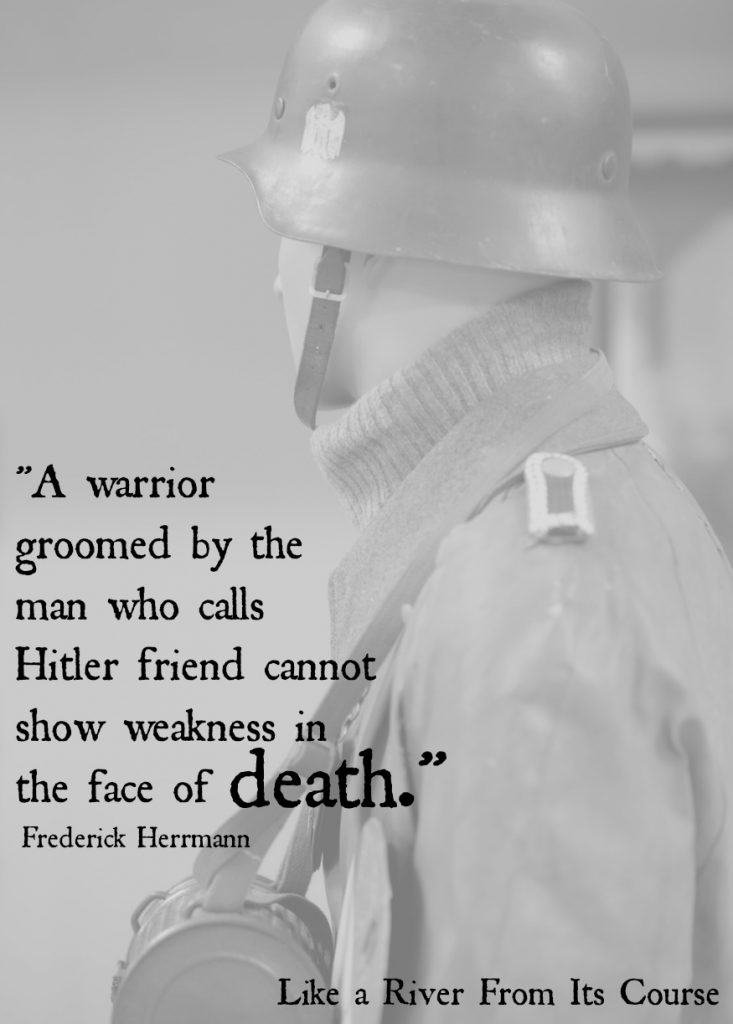
I fought for Frederick. I wanted to redeem him somehow. I wanted there to be a reason for his wickedness, and in the end I think there was some redemption for his character, though it wasn’t what I expected when I began writing.
I won’t spoil the story for you, but I will tell you that Frederick eventually became one of my favorite characters to write. By the end of the story, I no longer hated him. I pitied him, and I pitied all the boys like him – the real ones who believed that they were right and justified in their mission.
I don’t know what the after effects of the war were for those who pulled the trigger senselessly and brutally. I don’t know how the killings of Babi Yar, where 33,771 men, women, and children were slaughtered in two days time affected the young men who did the killing.
I have to believe that there were lasting effects. I have to believe that for many, though I suspect not all, of those young men, the images that they saw, that were caused by their own calloused hands, haunted them for the rest of their lives.
How could they not?
Frederick Herrmann was a young man swallowed by the ideals of his country, and by a desperate need to please his father. His story may have been fictional, but many of his surroundings and experiences were not. The names of his commanders are the names of actual German leaders in Kiev in those years.
I set out to write a historical fiction story that stuck as close to fact as possible. Though Frederick is fictional, his story is not so unlike many of the young men from those desperate days.
In the end, Frederick became as real to me as any of the other characters.
I know some of you have read the book – what did you think? What are your thoughts on Frederick (without giving spoilers, please!)?
Also – HOORAY! – Amazon has started shipping out books! Have you ordered your copy yet?*
Amazon has also opened up the reviews section of the book, so if you’ve read the book would you consider leaving a review?
Thanks, everyone!
*affiliate link
by Kelli Stuart | Faith, Family, Like a River From Its Course, Ukraine
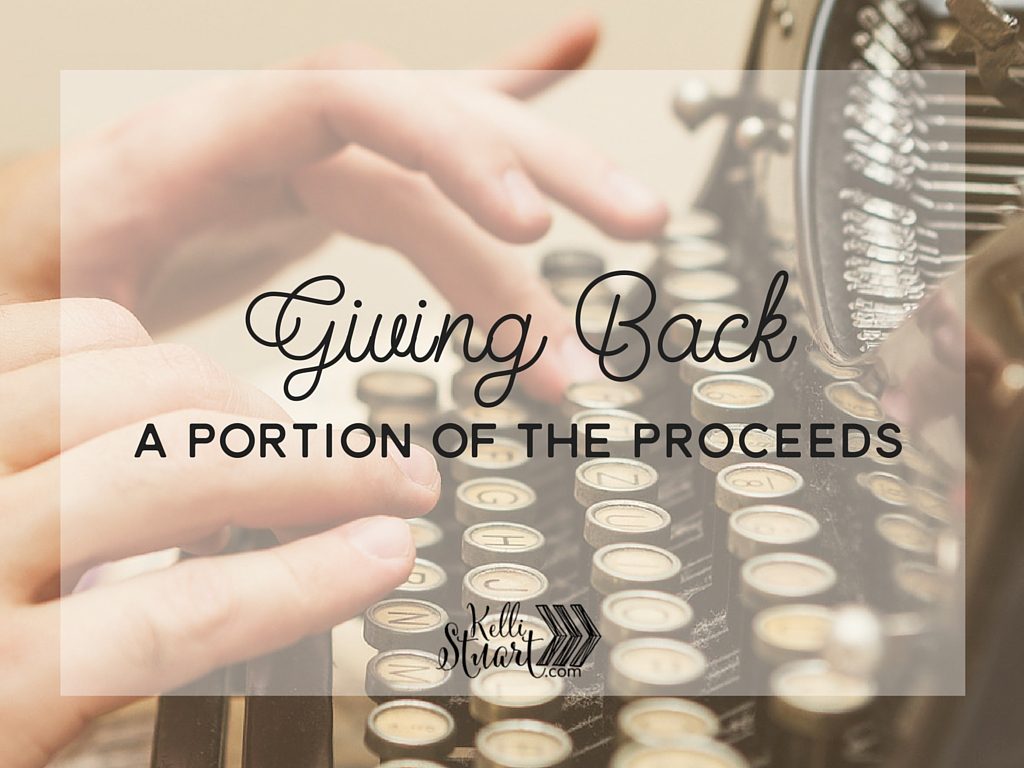
It’s no secret that orphan care is near and dear to my heart. It’s something that I care about deeply. Some women long to have children naturally, and cannot, and adoption is the way they grow their families.
I am, admittedly, quite the opposite. I longed to adopt the way that most women longed to have children naturally, and for whatever reason, that door has been closed to me. At least up until this point. The future is always a mystery, though…
After our Russian adoption was terminated, I poured myself into finishing my novel. All of the kids were in school at that point, so I’d drop Landon off at preschool, then drive to the Whole Foods around the corner and have ridiculously healthy food while I tapped away at my computer.
I shed big, giant alligator tears throughout the entire process. I called my husband on more than one occasion sobbing from the parking lot, my heart so utterly torn over this fractured dream. I felt lost and confused.
I was a mess.
Writing Like a River From Its Course* was part of my healing. Through the rhythmic tapping of my fingers, I released some of the inner angst that plagued me. As I dove head first into the heartache of my characters, I was able to dissect my own broken heart.
I grieved as I wrote, and in the end this novel kept the grief from swallowing me whole.
As I prepared to launch the book out into the world, I wanted to find some way to give back to the country that had given so much to me. How could I gift these stories back to Ukraine?
I bathed this in prayer, and the answer came swiftly in the form of a ministry called World Hope Canada.
I first stumbled across World Hope Canada when Lee and I were debating whether or not we should continue to pursue adoption, or accept our family as it was. As I researched, I found Hope House Ukraine, a division of World Hope Canada that ministers directly to young women who have aged out of the orphanage.
The story is long and twisty, and it involves more of me in tears so I’ll spare you all the details, but to cut to the chase, I have fallen in love with the work of this ministry.
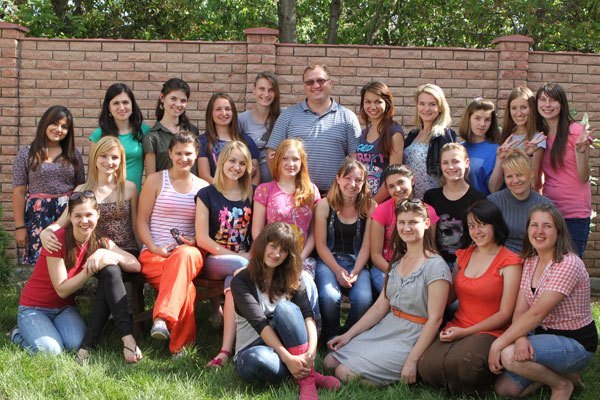
Image from Hope House Ukraine
Girls coming out of institutional homes are some of the most vulnerable in the world. They are often very young (many are aged 16-17), under-educated, naive, and they’ve spent much of their life without any direct guidance or supervision.
These young women are highly susceptible to human trafficking, substance abuse, and pregnancy, which only perpetuates a vicious cycle.
Hope House Ukraine is standing in the gap.
Hope House is a place where girls can live after leaving the children’s home. They are given a roof over their heads and tutoring so that they can pass the exams to get into trade schools. They’re taught life skills like how to maintain a home, how to garden and cook, how to operate inside a family, to live under authority, and to take responsibility for their futures.
There are now two fully operational homes in Ukraine, each of which houses beautiful girls who just need to be reminded that they have worth and value in this world.
From the World Hope Canada website: “Our vision for Hope House is to be a loving and supportive home where vulnerable girls can learn family and life skills, and receive an education so they can live successful, independent lives that are honouring to the Lord.”
As I bring Like a River From Its Course to the world, I want to give back to the country that gifted me these stories in the first place. I have committed up front to financially supporting Hope House Ukraine out of the proceeds that come not only from this novel, but from the books to come.
Specifically, I have chosen to sponsor a young girl named Masha in honor of the woman who inspired this book in the first place.
I hope that you will take a little time to look into Hope House and marvel at the work they’re doing in Ukraine. And if you would like to join me in partnering with this ministry, please let me know and I’ll help connect you to the right people.
In the meantime, please know that every time you purchase one of my books you are helping young women in Ukraine know and see their value. Every time you tell someone else about the book, you’re taking part in this amazing ministry.
Thank you for partnering with me in this way!

 A wicked, wretched little man, Blobel not only took credit for ordering thousands of Jews killed, but he was known to speak highly of his involvement in these mass executions.
A wicked, wretched little man, Blobel not only took credit for ordering thousands of Jews killed, but he was known to speak highly of his involvement in these mass executions.
![]()





 We need the stories in this book for such a time as this. We need to be reminded that man cannot be so easily broken. We need to recall a time when people rallied against a greater evil. We must remember the men and women who put their own lives on the line so that they could protect their neighbors.
We need the stories in this book for such a time as this. We need to be reminded that man cannot be so easily broken. We need to recall a time when people rallied against a greater evil. We must remember the men and women who put their own lives on the line so that they could protect their neighbors.











